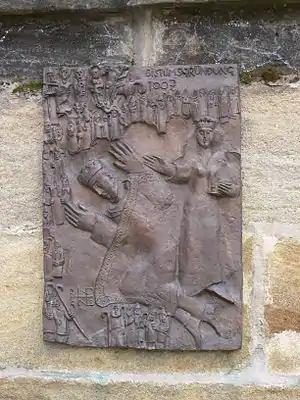1007
Year 1007 (MVII) was a common year starting on Wednesday (link will display the full calendar) of the Julian calendar.
| Millennium: | 2nd millennium |
|---|---|
| Centuries: | |
| Decades: | |
| Years: |
| 1007 by topic |
|---|
| Leaders |
|
| Birth and death categories |
| Births – Deaths |
| Establishments and disestablishments categories |
| Establishments – Disestablishments |
| Gregorian calendar | 1007 MVII |
| Ab urbe condita | 1760 |
| Armenian calendar | 456 ԹՎ ՆԾԶ |
| Assyrian calendar | 5757 |
| Balinese saka calendar | 928–929 |
| Bengali calendar | 414 |
| Berber calendar | 1957 |
| English Regnal year | N/A |
| Buddhist calendar | 1551 |
| Burmese calendar | 369 |
| Byzantine calendar | 6515–6516 |
| Chinese calendar | 丙午年 (Fire Horse) 3703 or 3643 — to — 丁未年 (Fire Goat) 3704 or 3644 |
| Coptic calendar | 723–724 |
| Discordian calendar | 2173 |
| Ethiopian calendar | 999–1000 |
| Hebrew calendar | 4767–4768 |
| Hindu calendars | |
| - Vikram Samvat | 1063–1064 |
| - Shaka Samvat | 928–929 |
| - Kali Yuga | 4107–4108 |
| Holocene calendar | 11007 |
| Igbo calendar | 7–8 |
| Iranian calendar | 385–386 |
| Islamic calendar | 397–398 |
| Japanese calendar | Kankō 4 (寛弘4年) |
| Javanese calendar | 909–910 |
| Julian calendar | 1007 MVII |
| Korean calendar | 3340 |
| Minguo calendar | 905 before ROC 民前905年 |
| Nanakshahi calendar | −461 |
| Seleucid era | 1318/1319 AG |
| Thai solar calendar | 1549–1550 |
| Tibetan calendar | 阳火马年 (male Fire-Horse) 1133 or 752 or −20 — to — 阴火羊年 (female Fire-Goat) 1134 or 753 or −19 |

Founding of the Archdiocese of Bamberg
Events
England
- King Æthelred the Unready pays the Danish Vikings a sum of 36,000 pounds of silver (Danegeld) to stop further invasions.[1]
Ireland
- The Book of Kells is stolen from the Abbey of Kells.
Japan
- January 1 (New Year’s Day) – Imperial Princess Shushi is granted the title Ippon Shinno (first rank princess).
- January 29 – Ranking ceremony of Murasaki Shikibu – as a renowned writer and lady-in-waiting, tutor of Empress Shōshi, she is elevated to the highest position in the palace below the empress.
- April – Imperial Prince Tomohira receives the title nihon (second rank prince).
Religion
- November 1 – King Henry II of Germany founds the Archdiocese of Bamberg during a synod held in Frankfurt.
- Ælfheah of Canterbury travels to Rome to receive his pallium – symbol of his status as an archbishop – from Pope John XVIII.
- The Keraites, a Turco-Mongolian tribe, are converted to Nestorianism (a sect of Christianity).[2]
Births
- Emeric, Hungarian prince and co-heir (approximate date)
- Gervais de Château-du-Loir, French nobleman (d. 1067)
- Giselbert, count of Luxembourg (approximate date)
- Hugh Magnus (Hugues le Grand), king of France (d. 1025)
- Ibn Sidah, Andalusian linguist and lexicographer (d. 1066)
- Isaac I Komnenos, Byzantine emperor (approximate date)
- Maitripada, Indian Buddhist philosopher (d. 1085)
- Ouyang Xiu, Chinese historian and poet (d. 1072)
- Peter Damian, cardinal-bishop of Ostia (d. 1073)
- Welf III, duke of Carinthia (approximate date)
Deaths
- February 27 – Ælfwaru, English noblewoman
- March 20 – Abu Rakwa, Andalusian Umayyad prince
- July 21 – Gisela of Burgundy, duchess of Bavaria
- October 31 – Heriger, abbot of Lobbes (Belgium)
- Attilanus, bishop of Zamora (Spain) (b. 937)
- Badi' al-Zaman al-Hamadani, Persian poet (b. 969)
- Guo, empress of the Song Dynasty (b. 975)
- Manjutakin, Fatimid general and governor
- Maslama al-Majriti, Andalusian chemist
- Pelayo Rodríguez, count (comes) of León
- Sebestyén, archbishop of Esztergom
- Urraca Fernández, Galician queen
References
This article is issued from Wikipedia. The text is licensed under Creative Commons - Attribution - Sharealike. Additional terms may apply for the media files.